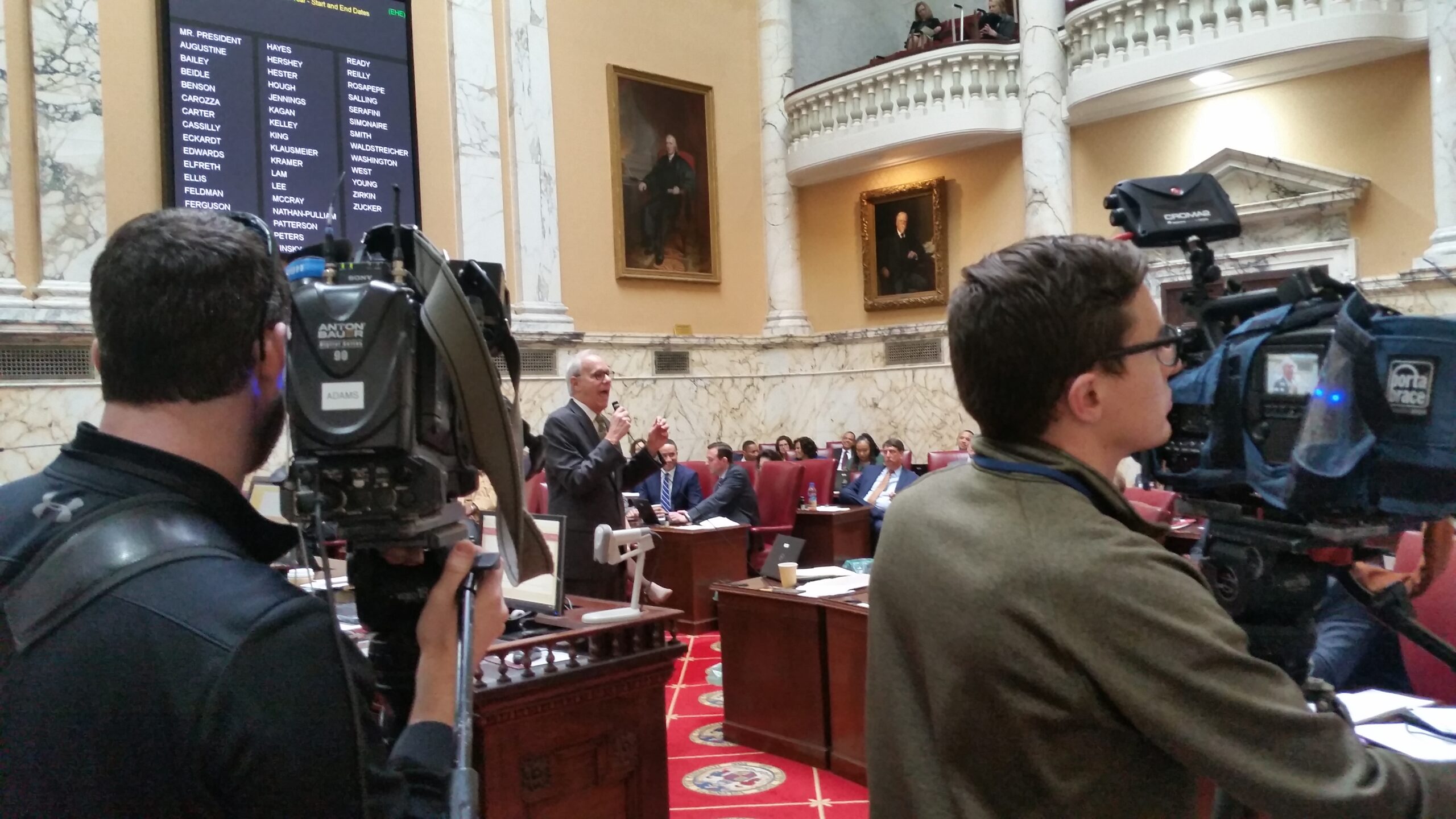War Over School Calendar Intensifies: ‘Marylanders Will Have the Final Say’

The State House debate over whether the school year in Maryland should start after Labor Day reached a fevered pitch Thursday.
Voting along party lines, the state Senate gave preliminary approval to legislation from Education, Health and Environmental Affairs Chair Paul G. Pinsky (D-Prince George’s) that would empower local school districts to determine when schools should open. Moments earlier, Gov. Lawrence J. Hogan Jr. (R) vowed to mount a multi-layered defense of his 2016 executive order mandating that schools everywhere open after Labor Day.
It has become a political test of wills for Hogan and the Democrats who control the General Assembly, belying leaders’ regular contention that Maryland does not experience the partisan food fights that have paralyzed the federal government.
At a State House news conference, Hogan said the effort to undo his executive order is being driven by “out of touch politicians and paid political operatives” in the Maryland State Education Association, the teachers’ union that has been among the governor’s fiercest critics.
“We’ve taken a lot of actions over the past four years, but I can’t think of any action that has as much enthusiastic support as this one,” Hogan said.
The governor took issue with critics’ contention that he unilaterally made the decision to push back the start of the school year. In fact, he said, he acted following a study commissioned in 2013 by the legislature and former Gov. Martin J. O’Malley (D) – and after lawmakers refused to advance the commission’s recommendations that the state economy would benefit from a later start to the school year and a longer vacation season.
Hogan suggested that the Democrats’ opposition to the calendar has materialized because it’s his initiative (and has also been championed by Comptroller Peter V.R. Franchot, a Democrat loathed by legislative leaders).
“Whatever action the legislature decides to take, they will fail,” Hogan vowed. “And Marylanders will have the final say.”
As the legislation overturning Hogan’s executive order begins to move through the Senate and House, the governor said he would pursue legislation to codify it into state law. His administration is drafting a bill that would require school districts to seek the approval of local voters if they want to start the school year before Labor Day.
“Our bill would offer genuine local control over the issue,” he said, arguing that the Senate legislation is “masquerading as local control” when it would in fact leave the calendar decisions in the hands of “a handful of unaccountable bureaucrats and administrators.”
Hogan said that if the legislation giving school districts control over their calendars passes, supporters of school after Labor Day will pursue a ballot initiative to overturn it.
“There is a 100 percent chance that the voters will overturn any action of the legislature,” he said.
Asked if he would veto the bill now before the Senate, Hogan replied, “We’ll have to take a look at that and see what makes sense.”
With Pinsky’s legislation on a fast track, at least in the Senate, it’s possible a bill will land on Hogan’s desk quickly enough that he’ll have to determine what to do well before the General Assembly session ends – meaning Democrats would have any opportunity to quickly override any veto.
Shortly after Hogan’s news conference, senators began a 90-minute debate on the school calendar legislation. Pinsky said the intent was simply to put the decision back in the hands of local leaders.
“Prior to 2 ½ years ago, each school board determined what was appropriate for their communities,” he said.
Local school officials have fretted that Hogan’s executive order, mandating that the school year start after Labor Day and end by June 15, is too constraining considering weather emergencies, religious holidays and professional development days for teachers. Some educators have also fretted that a longer summer vacation means students have more time to forget what they’ve learned in the previous academic year – and that poorer students suffer from a longer stretch of time without school-provided meals.
But Senate Republicans pushed back, advancing Hogan’s argument that the new school calendar is enormously popular and has provided an economic boon to key regions of the state. They suggested that the gap in start times is insignificant.
“I think what we’re talking about here is the difference of maybe a week?” said Senate Minority Whip Stephen S. Hershey Jr. (R-Upper Shore).
But Senate Finance Chair Delores B. Kelley (D-Baltimore County) said the issue is not the calendar but who gets to make decisions about children’s education.
“The bill is not in fact whether we start before Labor Day or after Labor Day,” she said. “It’s, do we believe in local control for the most basic service we provide as a government – education.”
In a preliminary vote, the Senate voted along party lines – 32-14, with one Republican absent – in favor of Pinsky’s bill.
Republicans then unsuccessfully attempted to add amendments to the bill. One would have mandated that the school year start after Labor Day but would have given local districts flexibility on the end-of-year date; one that would have mandated that schools devote a day to teaching students about the abolitionist Harriet Tubman; and one that would have codified Hogan’s executive order into state law.
The measures all failed along party lines – though Sen. James C. Rosapepe (D-Prince George’s) voted for the Tubman amendment.
Debate on another amendment, from Hershey, to formally declare Labor Day an official state school holiday, was put off to Friday morning. Senate President Thomas V. Mike Miller Jr. (D-Calvert) said a final vote on Pinsky’s bill would be scheduled for Tuesday – though procedural maneuvers could delay the outcome further.




 Creative Commons Attribution
Creative Commons Attribution